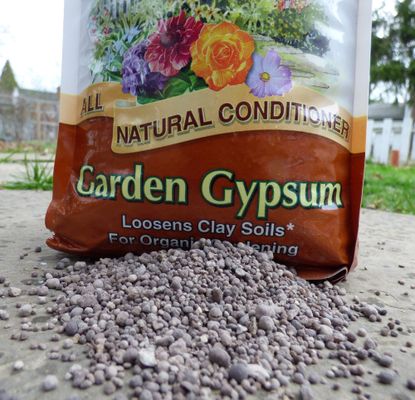What Is Gypsum: Using Gypsum For Garden Tilth


Soil compaction can negatively affect percolation, tilth, root growth, moisture retention, and soil composition. Clay soils in commercial agricultural sites are often treated with gypsum to help break up the clay and enhance calcium, which breaks up excess sodium. The effects are short lived but serve to soften the soil enough for plowing and sowing. In the home garden, however, it is not advantageous and regular additions of organic matter are preferred both for cost and side effect reasons.
What is Gypsum?
Gypsum is calcium sulfate, a naturally occurring mineral. It has been touted as beneficial for breaking up compact soil, especially clay soil. It is useful in changing the soil structure of excessively heavy soils which have been impacted by heavy traffic, flooding, overcropping, or simply overly weatherized. One of the main uses of gypsum is to remove excess sodium from the soil and adding calcium. A soil analysis is helpful in determining if you need to apply gypsum as a soil amendment. Additional benefits are a reduction in crusting, improved water run-off and erosion control, assisting in seedling emergence, more workable soils, and better percolation. However, the effects will only last a couple of months before the soil reverts to its original state.
Is Gypsum Good for the Soil?
Now that we have ascertained what gypsum is, it's natural to question, “Is gypsum good for the soil?” Since it reduces salt levels in soil, it is effective in coastal and arid regions. However, it doesn't work in sandy soils and it can deposit an excess of calcium in regions where the mineral is already abundant. Additionally, in areas with low salinity, it pulls out too much sodium, leaving the location deficient in salt. Considering the cost of a few bags of the mineral, using gypsum for garden tilth is uneconomical.
Garden Gypsum Information
As a rule, using gypsum for garden tilth will probably not harm your plants, but it simply is not necessary. Using a little elbow grease and lovely organic goodies from fall clean up or compost worked into the soil to a depth of at least 8 inches (20 cm.) will provide an excellent soil amendment. Studies have shown that soils with at least 10 percent organic matter don't benefit from the addition of gypsum. It also has no effect on soil fertility, permanent structure, or pH, while generous amounts of compost will do all that and more. In short, you can benefit new landscapes by application of gypsum on compacted soil if you have a need for calcium and have salt laden earth. For the majority of gardeners, the mineral is not necessary and should be left for industrial agricultural use.
Gardening tips, videos, info and more delivered right to your inbox!
Sign up for the Gardening Know How newsletter today and receive a free download of our most popular eBook "How to Grow Delicious Tomatoes."

Bonnie Grant is a professional landscaper with a Certification in Urban Gardening. She has been gardening and writing for 15 years. A former professional chef, she has a passion for edible landscaping.